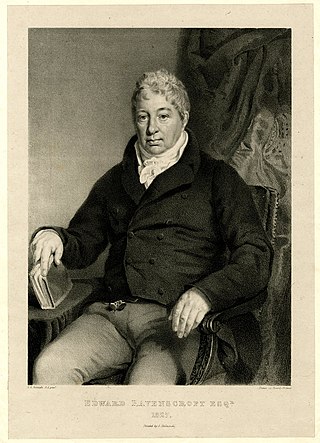This article contains information about the literary events and publications of 1681.
Thomas Ravenscroft was an English musician, theorist and editor, notable as a composer of rounds and catches, and especially for compiling collections of British folk music.
Sir John Trevor III was a Welsh politician who sat in the House of Commons at various times between 1646 and 1672.

Edward Ravenscroft was an English dramatist who belonged to an ancient Flintshire family. He was entered at the Middle Temple, but devoted his attention mainly to literature.
This is a list of people who have served as Custos Rotulorum of Flintshire.
Sir Thomas Littleton, 2nd Baronet was an English politician from the extended Littleton/Lyttelton family who sat in the House of Commons variously between 1640 and 1681.

(New) Hawarden Castle is a house in Hawarden, Flintshire, Wales. It was the estate of the former British prime minister William Gladstone, having previously belonged to the family of his wife, Catherine Glynne. Built in the mid-18th century, it was later enlarged and externally remodelled in the Gothic taste.

There have been twenty one baronetcies created for persons with the surname Williams, eight in the Baronetage of England, three in the Baronetage of Great Britain and ten in the Baronetage of the United Kingdom. Only six of the creations are extant as of 2017.

Sir John Glynne KS was a Welsh lawyer of the Commonwealth and Restoration periods, who rose to become Lord Chief Justice of the Upper Bench, under Oliver Cromwell. He sat in the House of Commons at various times between 1640 and 1660.
Events from the year 1681 in England.
This is a list of High Sheriffs of Flintshire.
John Salusbury was a Welsh politician who sat in the House of Commons at various times between 1626 and 1643. He supported the Royalist cause in the English Civil War.
Sir Kenrick Eyton was a Welsh lawyer and politician who sat in the House of Commons in 1660. He fought in the Royalist army in the English Civil War.

Sir Roger Mostyn was an English politician who sat in the House of Commons from 1621 to 1622.

Sir John Hanmer, 1st Baronet (1590–1624) was an English politician who sat in the House of Commons in 1624.
Sir John Hanmer, 3rd Baronet was a Welsh politician who sat in the House of Commons at various times between 1659 and 1690.
William Ravenscroft was an English politician who sat in the House of Commons at various times between 1586 and 1628.
Sir Peter Mutton was a Welsh lawyer and politician who sat in the House of Commons at various times between 1604 and 1624.
Edward Vaughan, of Glan-y-Llyn, Merionethshire and Llwydiarth, Montgomeryshire, was a Welsh Tory politician who sat in the English and British House of Commons for 43 years from 1675 to 1718. He was briefly Father of the House.
James Ravenscroft was a lawyer, merchant, and philanthropist in Chipping Barnet, in what is now north London.





